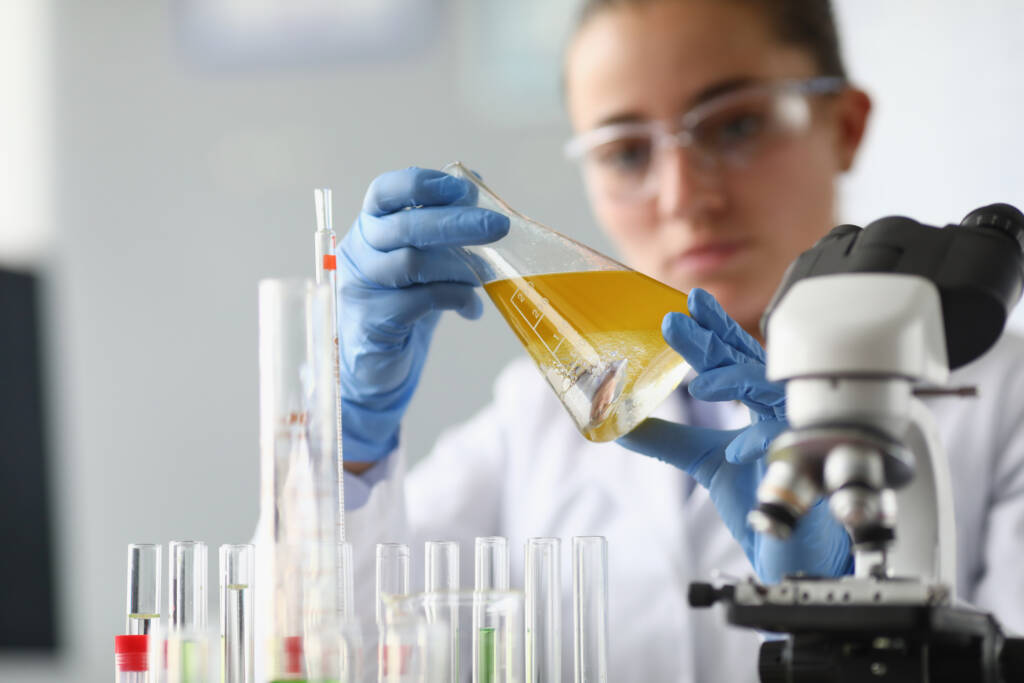
AP Biology (lab)

Note: This course is currently being updated. You can enroll now for a September start.
This course is designed to provide a college-level experience and prepare students for the AP exam in early May. Students will be provided with a foundation for developing an understanding for biological concepts through scientific inquiry, investigations, interactive experiences, higher-order thinking, real-world applications, writing analytical essays, statistical analysis, interpreting and collecting data. The key big ideas of the AP Biology course are system interactions, evolution, energetics, information storage, and transmission. Students will participate in a variety of engaging activities that enhance their mastery of biology concepts.
Major Topics and Concepts
Segment 1
Module 01—Chemistry of Life
- Hydrogen Bonding
- Properties of Water
- Elements of Life
- Biological Macromolecules
- Structure and Function of Macromolecules
Module 02—Cell Structure and Function
- Cell Structure and Function
- Cell Size
- Membrane Transport
- Facilitated Diffusion
- Tonicity and Osmoregulation
- Mechanism of Transport
- Cell Compartmentalization
Module 03—Cellular Energetics
- Enzymes
- Environmental Impacts on Enzymes
- Cellular Energy
- Energy Transfer
- Photosynthesis
- Cellular Respiration
- Fitness
Module 04—Cell Communication and Cell Cycle
- Cell Communication
- Signal Transduction
- Changes to Signal Transduction
- Feedback
- Cell Cycle
- Regulation of Cell Cycle
Segment 2
Module 05—Heredity
- Meiosis
- Meiosis and Genetic Diversity
- Mendelian Genetics
- Non-Mendelian Genetics
- Environmental Effects on Phenotype
- Chromosomal Inheritance
Module 06—Gene Expression and Regulation
- DNA and RNA Structure
- Replication
- Transcription and RNA Processing
- Translation
- Regulation of Gene Expression
- Gene Expression and Cell Specialization
- Mutations
- Biotechnology
Module 07—Natural Selection
- Natural Selection
- Artificial Selection
- Population Genetics
- Hardy-Weinberg Equilibrium
- Phylogeny
- Speciation and Extinction
- Variation in Populations
- Origins of Life
Module 08—Ecology
- Responses to the Environment
- Energy Flow Through Ecosystems
- Population Ecology
- Effects of Density of Populations
- Community Ecology
- Biodiversity
- Disruptions of Ecosystems
Course Materials
AP Course & Exam Registration Requirements
College Board requires students to register for AP exams no later than November 13th (individual schools may set earlier deadlines).
All VLACS AP students are required to enroll in the “course only” section in My AP. Instructions for joining My AP will be posted on each VLACS course page and instructors are available to help with this process.
Students who plan to take the corresponding AP exam must arrange to take the exam at a local school that administers it. To register for an AP Exam, the local school will enroll the student in an “exam only” section in My AP. Students should follow these steps:
- Search for a local test site through this resource of contact AP Services for Students at 888-225-5427 [email protected]. That office can give you contact information for local AP coordinators who may be willing to test outside students. Students are then responsible for contacting coordinators on that list to see if one can arrange to test for you. You should do this no later than October 2nd. Note that schools may have their own local deadlines for receiving requests from outside students to test at their school so we recommend doing this as soon as possible
- The AP coordinator who agrees to assist you must provide a join code for an “exam only” section in My AP. You’ll use the join code to join the section so that the AP coordinator can order your exam.
Please note that, if a school allows a student to register after the 11/13 deadline, there will be a $40 late exam fee. There will also be a $40 canceled/unused exam fee if a student registers and then cancels his/her exam or if the student does not show up on test day.
More information is available on the College Board’s website: https://apstudents.collegeboard.org/
Competencies
Chemistry of Life
Students will demonstrate an understanding of the chemistry of life by describing the characteristics of water molecules, summarizing biogeochemical cycles, describing the structure of macromolecules, and explaining the functions of macromolecules.
Cell Structure and Function
Students will demonstrate an understanding of cell structure and functions by describing cellular components, describing cellular exchange and transports, and explaining the role of the cell membrane.
Cellular Energetics
Students will demonstrate an understanding of cellular energetics by describing the characteristics of enzymes, explaining the role of cellular energy, and comparing the function of metabolic pathways.
Cell Communication and Cell Cycle
Students will demonstrate an understanding of cell communication and the cell cycle by describing the process of cell communication, comparing feedback mechanisms, and describing the stages of the cell cycle.
Herdity
Students will demonstrate an understanding of heredity by summarizing the process of meiosis, describing genetic diversity, and explaining chromosomal inheritance.
Gene Expression and Regulation
Students will demonstrate an understanding of gene expression and regulation by differentiating genetic information, describing protein synthesis, and explaining gene expression.
Natural Selection
Students will demonstrate an understanding of natural selection by describing mechanisms of evolution, analyzing population genetics, and evaluating evolutionary evidence.
Ecology
Students will demonstrate an understanding of ecology by relating ecosystem dynamics and energy flow, comparing population and community ecology, and describing components of biodiversity.
